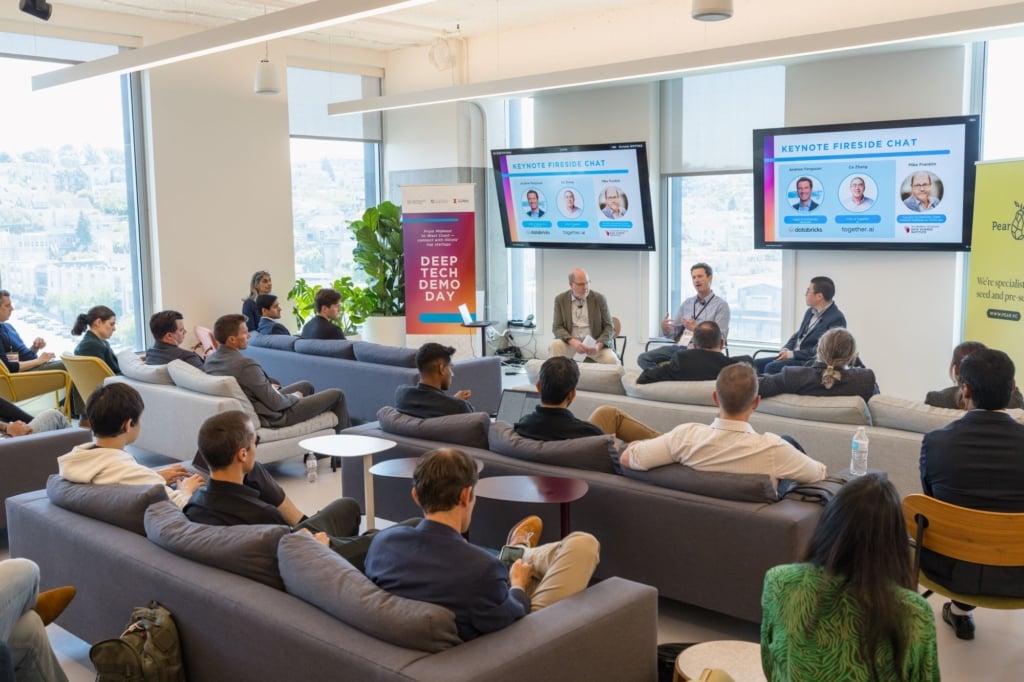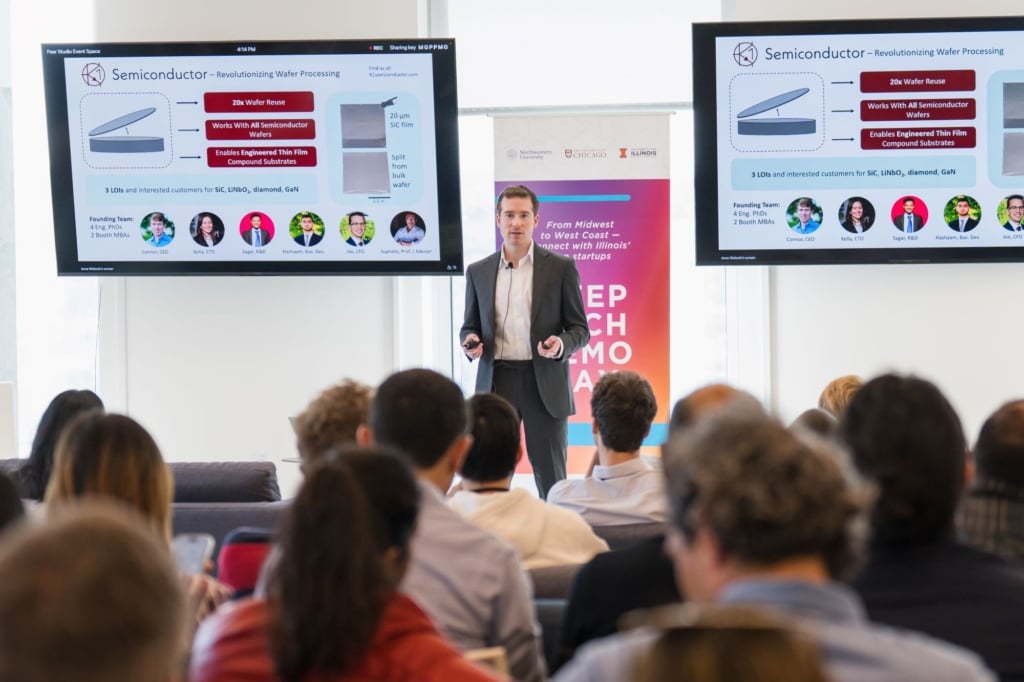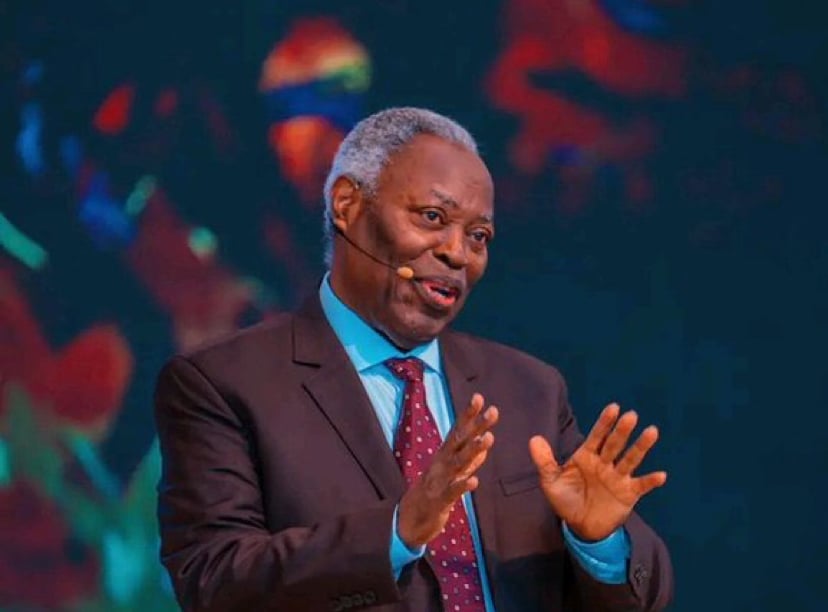The Power of a Shared Ecosystem: 27 Midwest Startups Pitch at Deep Tech Demo Day in San Francisco
The private, invite-only demo day brought together nearly 175 Bay Area investors to hear pitches from startups working across cleantech, AI, robotics, quantum, and more, at Pear VC in San Francisco.
The event took place during SF Deep Tech Week, which draws thousands of founders, investors, researchers, and industry leaders.
“We’re thrilled to spotlight the power of our shared ecosystem,” said Lisa Dhar, associate vice president for innovation and new ventures, Northwestern University. “Today is a showcase of the transformative potential of deep tech in the Midwest. Together, our institutions are leaders in fields such as advanced materials, manufacturing, quantum, mobility, robotics, and beyond.”
“Our ecosystem is rooted in deep collaborations between the universities, between researchers and founders, and, critically, between investors and company builders. It’s with that spirit of partnership that we are here today. To deepen our ties, forge new ones, and accelerate the impact of breakthrough technology,” Dhar added.
The event was hosted by Pear VC, specialists in pre-seed and seed funding. About 40% of its portfolio comes directly from universities, noted Mar Hershenson, founding managing partner of Pear VC.

Image left to right: Michael Franklin, Andrew Ferguson, and Ce Zhang.
To set the stage, Michael Franklin, Morton D. Hull Distinguished Service Professor, senior advisor to the provost for computing and data science, and faculty co-director of the Data Science Institute, moderated a discussion between Neubauer Associate Professor of Computer Science and Data Science Ce Zhang, CTO of Together.AI, and Andrew Ferguson, Head of Databricks Ventures.
“We’re all here because we deeply believe in the importance of innovation at the very early stages,” said Franklin. “When put together with expertise in domain and business, that’s how huge innovations happen and that’s how the world changes – and that’s why we’re all here today.”
Exemplifying this, Zhang’s startup Together.AI in February announced its $305 million Series B funding round. In the process of launching the startup, Zhang said he received a lot of support from UChicago.
“I don’t think I could do what I’m doing at any other place,” he said. “The support all the way from the department to the University, I think that’s also very important for this collaboration between academia and industry to actually happen.”
Moving from the lab to the market still is a difficult process and one that includes many lessons, one that Franklin said he learned the hard way.
“As technologists, we believe that the technology is of course the main thing behind the company – it’s what we get out of bed in the morning to work on, it’s what we’re excited about. But where a lot of companies, especially ones coming from universities, start to stumble is in the transition from a great technical idea, this great technology, into turning that into a business,” he explained.
Offering their advice to the founders in the room on how to navigate that transition, Ferguson, from an investor’s perspective,e said he is interested in articulated use cases and pain points that a technology solves. “Can you talk about a specific use case, a specific customer, and quantifiable real value around how the technology did something real in practice rather than just in theory? That’s hugely impactful,” he said. Even if the platform could ultimately be very broad, showcasing one or two “wedge areas” where you can build initial business momentum would resonate better in a pitch, he explained.
As a founder, Zhang stressed having the right team. “Because professors have an obsession, they also need help. They need a whole support network for things to actually work.” This includes other cofounders and advisors – people to talk to and get feedback from.
“We are really lucky that we assembled this really great group of friends who share the same dream and have different obsessions that complement each other, and have this great support network from the University and investors,” added Zhang.

27 startups pitched at the Deep Tech Demo Day.
Jed Taylor, assistant dean for innovation and entrepreneurship and executive director of the Technology Entrepreneur Center, University of Illinois Urbana-Champaign, introduced the startups, each of which gave three-minute pitches.
“Collectively, our three universities perform around $2.7 billion in cutting-edge research in our labs every year, and, because of that, a lot of the startups we launch are deep tech startups,” said Taylor.
The pitches included five student teams, including three from the University of Chicago: Rayni, K1 Semiconductor, and Solitude Labs, who were the first, second, and third place winners, respectively, of the 29th Annual Edward L. Kaplan, ’71, New Venture Challenge (NVC) earlier this month.
“The demo day marked a huge success for everyone – and was one of the largest events in the history of the Polsky Center in terms of sheer volume of investors present. The startups received significant interest and met new interested investors,” said Samir Mayekar, associate vice president and managing director of UChicago’s Polsky Center for Entrepreneurship and Innovation, after the event. “We’re looking forward to building on this success and continued collaboration with our colleagues at Northwestern and University of Illinois Urbana-Champaign to bring this event to more cities and additional audiences, so stay tuned.”
Thank you to our Series A Sponsors, Cooley LLP, Databricks, McDonnell Boehnen Hulbert & Berghoff LLP, and World Business Chicago, and Seed Sponsors J.P. Morgan and MFV Partners, for making this event possible.










